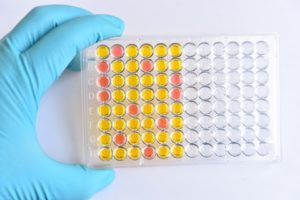New Enzyme Study Highlights a Potential New Mesothelioma Treatment
 Maryland researchers say an enzyme in mesothelioma tissues could be key to fighting this deadly cancer.
Maryland researchers say an enzyme in mesothelioma tissues could be key to fighting this deadly cancer.
Doctors at the University of Maryland say the enzyme, called Transglutaminase 2 (TG2), plays an important role in the inhibition of RNA synthesis which, in turn, can influence the development and spread of malignant mesothelioma.
A New Target for Mesothelioma Therapy?
Mesothelioma is a cancer of the lung linings that develops in response to asbestos exposure. Mesothelioma patients have a limited life expectancy. Chemotherapy with or without surgical resection is the standard of care. This poor clinical experience speaks to the need for new treatment strategies.
Current mesothelioma treatments do not target cancer stem‐like (MCS) cells. MCS cells are a small part of aggressive mesothelioma tumor cells. They control the growth of cancer cells. And they mediate drug resistance.
It is important to target these cells to limit the growth of mesothelioma cancer cells.
Oncologists from the University of Maryland wanted to find a way to target MCS cells. They were able to isolate an enzyme called TG2 in MCS cells that is important for cell survival. An enzyme is a protein that makes up a cell.
The TG2 enzyme in MCS cells is key to cancer cell survival. And it is also key to cancer cell death. In fact, cancer cell growth is markedly reduced in the absence of TG2 enzyme.
New mesothelioma treatments may target the TG2 enzyme in MCS cells. The present study identifies the TG2 cancer cell survival protein as an upstream factor in mesothelioma cancer cells. Targeting this specific enzyme may be a useful mesothelioma treatment strategy.
Source
Naselsky, Warren, Gautam Adhikary, Suruchi Shrestha, Xi Chen, Geraldine Ezeka, Wen Xu, Joseph S. Friedberg, and Richard L. Eckert. “Transglutaminase 2 enhances hepatocyte growth factor signaling to drive the mesothelioma cancer cell phenotype.” Molecular Carcinogenesis (2022). https://doi.org/10.1002/mc.23399





